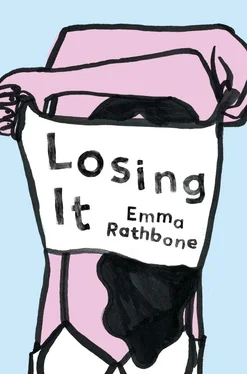Her name was Stephanie Garcia, and she was a backstroker, like me. I’d worked hard to establish myself on the team, to make myself indispensable. I couldn’t believe it when, five minutes later, she surged by in the lane next to me with what seemed like appalling ease. She was like an engine running on cool, mean energy that would never be depleted, a new model that makes you see all the clunky proportions and pulled-out wires of everything else. I tried to catch up, I really tried, but I couldn’t.
Five hours a day, six days a week, gouging it out in the hours before school started; the cracked hands, the chlorine hair, the shivering bus rides and random hotel rooms, the fees, the dogged effort of my parents, the year I didn’t menstruate, all of it to just be really, really, really good at one thing. And then someone strides in with a kind of poured-gold natural ability; someone who hits the clean, high note you’ve been struggling for with an almost resentful nonchalance, and the game is over.
You could feel the coaches, even that morning, readjusting their focus, reassembling the team in their minds. I could see how it would all play out — how hard I would have to work, how many more hours I would have to put in, just to maintain my place. Older, shorter, I would never be as good as her. Plus there was my shoulder. I’d been ignoring it, but it was there — a light popping that couldn’t be worked out — a button caught somewhere in the works. It would only get worse.
Mentally, I quit that morning. A part of me wondered if I’d been secretly waiting for something like this to happen, or if I wasn’t as determined as I always thought I’d been. But it wasn’t that. It was an immediate understanding of what was now before me. A lifetime of knowledge and observation served me in one life-changing assessment. I guess I can be grateful that I just knew and didn’t delude myself.
It took me a week to say something to Coach Serena. She was the kind of clean, windswept older lady I hoped to be one day. But her manner during our conversation, though perfectly pleasant, confirmed my instincts. She said she was sorry to see me go, and I believed her, but she didn’t try very hard to convince me to stay. I stared at a decorative bronze anchor hanging on the wall of her office in a low-lit subbasement of the Memorial Gymnasium as we made the sterile small talk — so different from the years of barky, feral encouragement — that would be our final interaction.
With a year and a half left of college, I found myself beached on a communications degree I had no interest in. When I’d had to pick a major, I’d gleaned from other swimmers that it would be the easiest, but I’d still barely coasted by. I graduated by a hair, and, not knowing what else to do, I moved in with my friend Grace. We had a small one-story house in Tempe. I got a part-time job at a cell phone store — long, silent afternoons behind a counter, or assembling cardboard cutouts of buxom families on their devices. I started coaching, herding little kids in their bathing suits with their big stomachs, talking to parents who lingered after practice. It was all the chaff of the swimming world I’d once dominated, and I realized I had no interest in being on the sidelines. I wanted to shuck it all off.
I went to a career counselor at Alumni Services and she convinced me that the determination I’d exhibited in my swimming career, as well as my communications degree, made me a perfect candidate for some kind of vague position in the business world (she mentioned something like “account manager” and “verticals”), and that moving to the East Coast, where I didn’t know anyone save a cousin who bore for me a mutual dislike due to years of forced hanging out at holidays and family reunions, was not a terrible idea.
My second mistake was not doing more research and finding a good place to live. I was moving to a big city, a place I didn’t know, but I didn’t realize there were neighborhoods where young people were supposed to live. I believed the website of the apartment complex I ended up moving into, called Robins Landing, that said it was a mile from the charming downtown of a sub-city called Arlington. What they didn’t tell you was that it was an unwalkable mile of overpasses and parking garages, part of the never-ending Washington, D.C. — area sprawl.
Still, when I first started, I liked the job. I liked the rituals of the working business world, all new to me. I took satisfaction in my painstakingly selected svelte new professional clothes, and striding across the rain-soaked walkway and through the glass doors of the building I worked in. And other little things, like shaking a sugar packet in the break room, and then pouring it into a mug of coffee. I saw myself doing that from the outside, efficiently shaking a sugar packet in my pencil skirt and quarter-inch heels. This is what people did, I thought. They got jobs. They went to meetings. They made friends and exchanged knowing and humorous comments in the hallways about all the same TV shows.
I did hang out with Paula, my cousin, a few times, at her massive house in Silver Spring, Maryland. I’d balance a glass of wine on my lap and sit in the excruciating silence I remembered from our interactions as kids. “Nice bowl,” I’d say, pointing to the one on her coffee table. “Is that— Did you make it? Is it made out of clay?” “No,” she’d say, wiping something off the corner of her mouth, her red hair scraped back into a bun, her old-man’s face as usual just never giving an inch. “It was a gift from Danny.”
“Danny…”
“Kinsmith. Your other cousin ? If you ever called him he’d tell you he’s taken up ceramics.”
I got cable and high-speed Internet. I said hi to my neighbor, a Syrian refugee named Joyce, while getting the mail. I inched forward on the parkway every morning in my car. I bought a lot of frozen dinners and microwaved them and dealt with all the packaging — plastic film and cardboard and compartments that needed to be pushed down in the trash. I sorted through credit card offers and bills and junk mail with the meticulousness of someone with too much free time. The complex had a game room with a pool table and a flat-screen television and sofas, and now and then I’d take a book and go sit and spy on the other tenants, the few who ventured in to watch sports. Or I’d idly sketch the fake holly branches coming out of a vase in an alcove in the wall, and then my hand would pause on the page and I’d look up and see myself from the outside and wonder just how I got slung into this padded room on the damp East Coast, and I couldn’t tell if every decision I’d made up to this point, every link that had led me here, had mattered a lot, or hadn’t mattered at all.
Back up in my apartment I’d lie in the middle of my living room and toss a small pillow up and down, and think about my virginity, and wonder if it subtly shaped everything I did. Was it possible that people could tell on some frequency, like that pitch or tone that only dogs can hear? Were the un-lubed, un-sexed wheels and gears in me making my movements jerky? And would that quality itself ward men off? I could already feel that happening. Out at a bar, when a guy started talking to me (not that this happened very often), all I could think about was where it was going to go. I wouldn’t be able to get into the flow of conversation because I’d imagine the inevitable moment when I’d have to tell him, and how fraught it would then become, and how strange he’d think it was that I’d picked him. Or maybe I wouldn’t have to tell him, but was it possible to just play it off? But then my hesitation would read as disinterest and the whole thing would derail from there. I could see what was happening — that the more I obsessed, the more I veered off track. But I couldn’t stop. I couldn’t relax. And so here I was, twenty-six and bottlenecked in adolescence, having somehow screwed up what came so easily to everyone else, and I couldn’t put my finger on when this had started happening.
Читать дальше
Конец ознакомительного отрывка
Купить книгу












